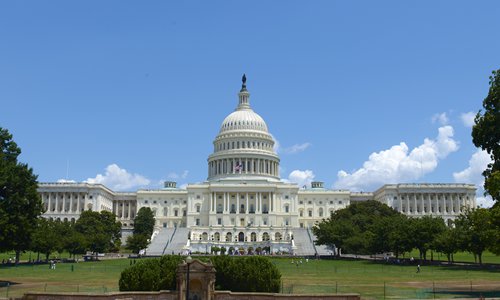HOME >> OPINION
Washington not world’s ‘beacon of democracy’
By Ai Jun Source:Global Times Published: 2019/9/16 23:28:40

Photo: VCG
It is said that the inspiration for US democracy can be traced to the country's Declaration of Independence, Constitution, and Bill of Rights, which were born in 1776, 1788 and 1791, respectively. There was a time when Washington was considered a beacon of democracy. But in the 21st century, the old-fashioned missionary mentality and the worldview of US politicians have remained unchanged. This may be one of the reasons for constant chaos across the globe today.
On Sunday, the International Day of Democracy, US Secretary of State Mike Pompeo issued a statement stressing that the US "will continue to be a leader in protecting civic space to bolster the foundations of democracy."
But has the US been a qualified "leader" to protect democracy? Looking at the turbulence in the world, you will find the US triggered quite a few of them in the name of promoting democracy.
Take the Iraq War, which was launched by the US in 2003. At that time, then-US president George W. Bush was seeking to promote the transformation of the Arab countries toward democracy, believing that a lack of democracy in the region was the root cause of terrorism. During the 2011 "Arab Spring," Washington played a supporting role in pro-democracy uprisings, cheering for the arrival of democracy in North Africa and the Middle East. But the flames of democracy have brought nothing but disorder.
In recent months, when Hong Kong has been suffering from violent protests, many US politicians did not hesitate to voice their support for the radical protesters in the city. Yet, will any of Hong Kong's problems be resolved by supporting the rioters in ruining their city?
Politicians from Washington are even discussing the promotion of the Hong Kong Human Rights and Democracy Act of 2019 aimed at reaffirming US commitment to Hong Kong's human rights, democracy, and rule of law. The US seems to believe the move could intimidate China. Young leaders of violent protests in the city, such as Joshua Wong Chi-fung, obviously believe so. Wong even urged the US to include a "human rights clause" in the US trade agreement with China. But do US politicians believe it could work?
Today's US is no longer qualified to proclaim itself the beacon of democracy. In the name of democracy and progress, the country has mostly proved its capacity to make wars. When former US secretary of state Hillary Clinton tweeted, "May we all stand in solidarity with the people of Hong Kong as they speak out for democracy, freedom," a foreign netizen responded, "No. The last time you stood with others, Libya, Syria, Iraq, Yemen... all of them burned to the ground."
US-style democracy is by no means poisonous, but it is far from being a panacea.
However, amid great changes worldwide, Washington's mind-set is still immersed in the 18th and 19th centuries. The outdated fantasy that the US is the best at everything is extreme.
Being a leader of democracy does not mean screaming democracy in other country's faces. When the US makes such a commitment, it might as well think about more pragmatic measures, including promoting the global development of the basic human rights, such as social welfare, the right to decent work and affordable housing, and offering more global public goods, rather than upholding trade protectionism and the "America First" policy.
RELATED ARTICLES:
Posted in: OBSERVER